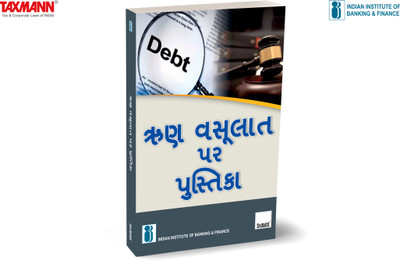IIBF X Taxmann's Handbook on Debt Recovery | Gujarati ŌĆō Comprehensive Guide Covering Products & Services of Banking System | Debt Recovery Process | Legal Aspects | Soft Skills & Attributes(Paperback, Indian Institute of Banking, Finance)
Quick Overview
Product Price Comparison
This book has been prepared to serve as a comprehensive guide for debt recovery agents and their essential role in debt recovery. The book's objective is to provide a deep understanding of the debt recovery process and the various stages and guidelines to be followed by the debt recovery agents. This book will be an essential guide for all debt recovery agents, whether they are associated with banks or NBFCs in their recovery process. The Present Publication is the 2023 Edition, revised and updated by A.C. Chug (Former Chairman M G B Gramin Bank sponsored by the State Bank Group) and vetted by Dr. R. Bhaskaran (Former CEO ŌĆō IIBF and Former CGM ŌĆō NABARD). Taxmann exclusively publishes this book for IIBF with the following noteworthy features: (i) [New Section on Non-Banking Financial Companies (NBFCs)] has been added to this book (ii) [Inputs on Collection/Recovery Function] which includes: (a) Basic Information and Principles (b) Underlying Credit Collection (c) Procedures Involved in the Collection Function (d) Codes to be Adopted by Recovery Agent, etc. (iii) [Additional Features on Collection/Recovery Function] such as: (a) Valuable Tips (b) Techniques (c) Illustrative Real-world Examples (d) Best Practices (iv) [Select Coverage of the Most Important Topics] are as follows: (a) Soft Skills and Attributes which are required to be a successful debt recovery agent (b) Insights into the Techniques and Methods Required by debt recovery agents to communicate with debtors and improve collections (c) Ethical Considerations & Regulatory Framework that govern the work of debt recovery agent (d) Consequences of Engaging in Unethical/Illegal Practice along with the importance of treating debtors with respect and dignity The detailed contents of this book are as follows: (i) Module A ŌĆō Basics of Banking (a) Overview of Banking and Finance (b) Banker-Customer Relationship (c) Various Deposit Schemes and Other Services (d) Account Opening and Operations in Accounts (e) Provisions of the NI Act for Payment and Collection of Cheques (ii) Module B ŌĆō Brief Outline of Various Products and Legal Aspects of Recovery (a) Credit Cards and Debit Cards (b) Various Types of Loans and Advances (c) Securities and Modes of Registration or Recording Securities (d) Loan Documentation (e) Income Recognition and Asset Classification (f) Legal Aspects of Loan Recovery (g) Collection Operations (iii) Module C ŌĆō DRA Role in Loan Recovery and Soft Skills (a) DRA ŌĆō Meaning, Legal and Regulatory Framework (b) Functions of Debt Recovery Agents (c) Policy, Process and Procedure of Debt Recovery (d) Soft Skills and Strategies for Debt Recovery (e) Rights and Duties of Recovery Agents (f) Fair Practices Code for Lenders (iv) Module D ŌĆō Additional Reading on NBFCs (a) Non-Banking Financial Companies (NBFCs) (b) Fair Practices Code (FPC) for NBFCs (v) Appendices (a) RBI Circular on Recovery Agents Engaged by Banks (b) IBA ŌĆō Model Policy on Collection of Dues and Repossession of Security (c) Case Laws on Payment of Cheques and Liability of Paying Banker (d) RBI Guidelines on Managing Risks and Code of Conduct in Outsourcing of Financial Services by Banks (e) Case Laws on Repossession and Enforcement of Securities (f) Glossary of Banking Terms (g) Some of the Important Cases Dealt by the Banking Ombudsman Offices (h) Outsourcing of Financial Services ŌĆō Responsibilities of Regulated Entities Employing Recovery Agents

